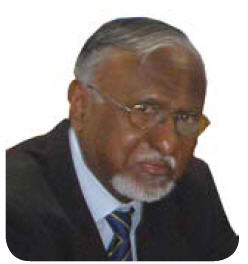In November, I met Prodipto Ghosh at ESCAP in Bangkok, where he was attending a workshop in preparation for an ADB–UNESCAP–UNEP publication on green growth. Over lunch, I learned what Prodipto’s been up to in the last 7 years.
In 2001, a few people at ADB who were working with Prodipto walked into his office and congratulated him. “For what?” he asked, “Did I get a promotion?” They informed him that, according to the Internet, he was the new Additional Secretary to the Prime Minister of India.
This came as a surprise—and an interesting challenge. As a former civil servant, Prodipto felt dutybound to heed the call to return to government, and he left ADB well prior to retirement age to move into a very hefty job indeed. In 2003, he became the Secretary, Ministry of Environment and Forests. In 2007, he retired again, this time from government service, only to launch into an even busier life with The Energy and Resources Institute (TERI), a nonprofit scientific and policy research organization working in India and globally in the fields of energy, environment, and a whole range of other issues toward sustainable development.
 As one of TERI’s 12 Distinguished Fellows (in its staff of about 700), Prodipto is working on a multitude of issues—including energy, environment, and governance. Recently he has primarily been helping the government prepare its position on climate change, and handling some of the negotiations. He is also working on climate change policy—given the melting of the Himalayan glaciers, India will be severely impacted due to a change in water flows as well as other factors, such as increasing temperatures. He has had significant input to India’s National Action Plan on Climate Change.
As one of TERI’s 12 Distinguished Fellows (in its staff of about 700), Prodipto is working on a multitude of issues—including energy, environment, and governance. Recently he has primarily been helping the government prepare its position on climate change, and handling some of the negotiations. He is also working on climate change policy—given the melting of the Himalayan glaciers, India will be severely impacted due to a change in water flows as well as other factors, such as increasing temperatures. He has had significant input to India’s National Action Plan on Climate Change.
At TERI, Prodipto really enjoys working with the younger people, who personify a generational cultural shift—they respect experience, intelligence, and ability; age and seniority alone won’t do the trick. Prodipto notes that the younger ones keep everybody on their toes.
In addition to his many involvements with and through TERI, Prodipto has a few other items to assure that he has no spare time, including chairing a committee that decides on performance awards to petroleum companies for their action toward the sector’s sustainability, governance, innovation, and—to get the balance right—the best female staff members. And he advises the Federation of Indian Chambers of Commerce and Industry (FICCI) regarding climate change and environmental policy issues. He serves on two committees for FICCI, one on climate change and industry, and another on traditional knowledge systems, which involve complex issues such as assigning property rights.
Just before returning to the workshop, I asked Prodipto if he saw his wife occasionally between all these activities, and he noted he had been traveling so much lately that he had far too little time at home. Prodipto has two sons—one now working at ADB, and the other a sophomore at Carnegie Mellon. If you’d like to know more about what Prodipto has been up to, Google him and look at a smidgeon of the over 15,000 items that come up.
